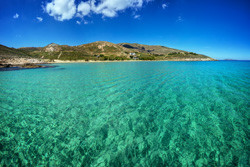Effect of changing pH on the Mediterranean
The MEDSEA(opens in new window) (Mediterranean Sea acidification in a changing climate) project was established to plug the knowledge gap. The initiative examined the impacts of acidification. on this unique and highly populated region. The goal was to forecast chemical, climatic, biological and socioeconomic changes driven by increases in atmospheric CO2 and consequent changes in sea water carbonate chemistry. Researchers focused on the combined impacts of acidification and warming of the Mediterranean both related to the increase in greenhouse gases on organisms that are unique or endemic to the Mediterranean Sea, major contributors to habitat building, and/or ecological function, or species of economic value in the region. The regional vulnerabilities alter the capacity of coastal and marine systems to provide ecosystem services and consequently affect economic activities and human welfare. Projections were based on new observations of chemical conditions together with new observational and experimental data on the responses of these key organisms and ecosystems to the changing marine environment. This information was fed into physical-chemical ocean models that were improved to account for the Mediterranean's fine-scale features. The resulting data was used to provide the best scientific advice to policymakers developing regional strategies for adaptation and mitigation. Marine environmental protection and new knowledge of marine ecosystems is now a key part of the EU's latest research framework programme, Horizon 2020. The MEDSEA project set up an Mediterranean Reference User Group, which was instrumental in disseminating information related to acidification. Furthermore, one of the main project goals was to engage with society at large in the fight against ocean acidification. To achieve this, the team targeted increased awareness, social activities and events, and the dissemination of key data on socially and economically sensitive topics. The sectors most affected include fisheries, aquaculture and tourism. Therefore, seafood producers and harvesters, local authorities and sports divers participated in questionnaires and fieldwork developed by project partners. Knowledge gained through MEDSEA work is of both regional and global importance. It will support negotiation for more stringent regulation and a suitable response to the challenges of climate change and warming by making the issue a top priority for all levels of governance.







